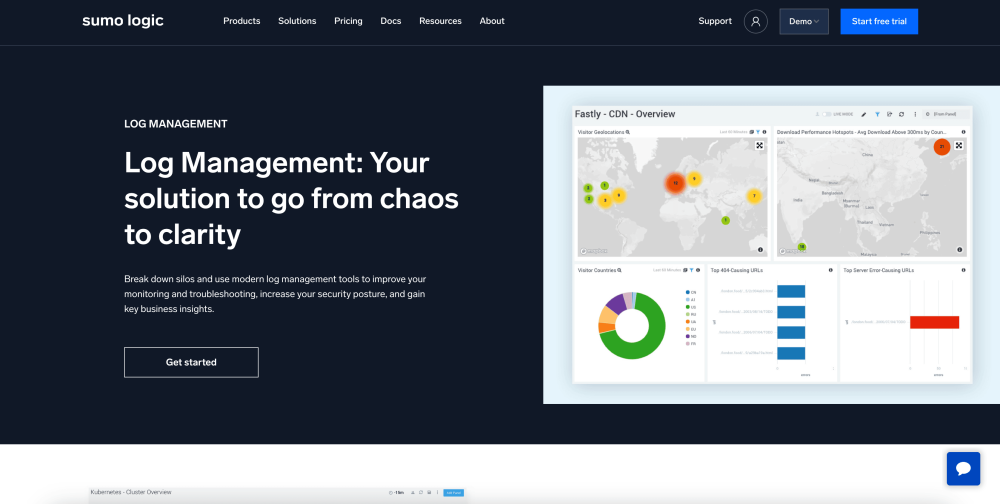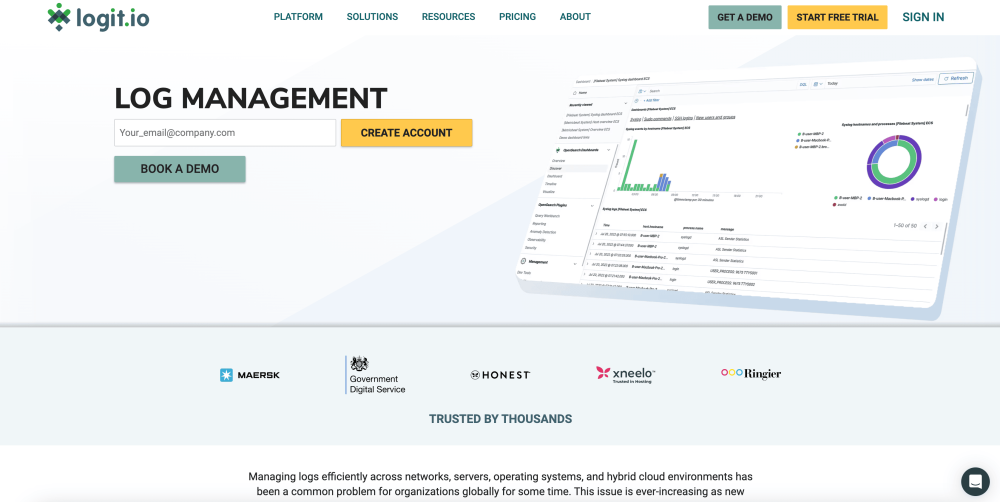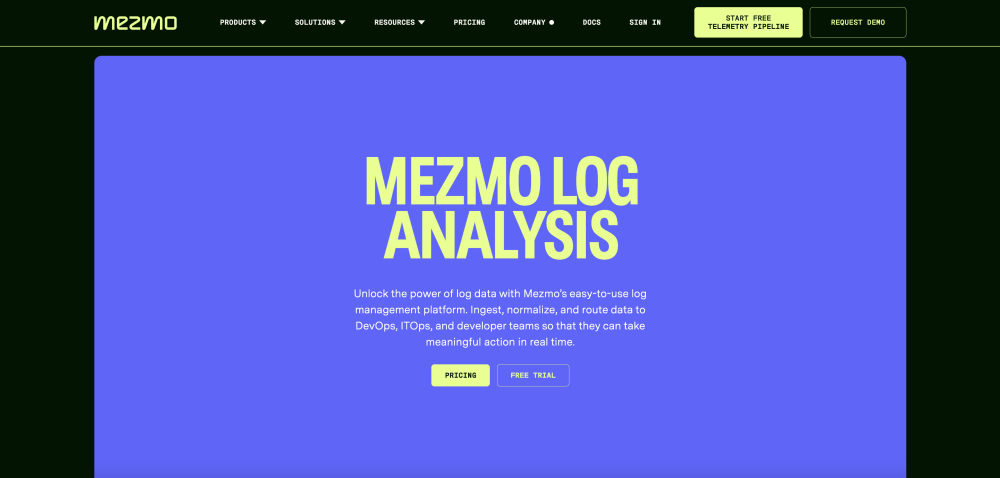Resources
6 min read
Monitoring all of your organization’s logs can be challenging particularly when these logs are generated by various systems, applications, and devices, often in a variety of different formats. As well as this, the sheer amount of logs produced can be overwhelming, sifting through vast amounts of log data to find relevant information becomes time-consuming and inefficient. This highlights the need for a centralized log management that can alleviate these difficulties.
By incorporating a centralized log management solution into your organization you can streamline the entire process of deriving insights from your logs and enhancing overall efficiency and security.
Contents
What is Centralized Log Management?
Centralized log management provides a system that collects, stores, and analyzes log data from different sources of a given organization in one unified platform. This approach simplifies monitoring and debugging because it offers one place to get a comprehensive view of all logs for easier and more effective detection of issues, security threats, and performance problems.
Also, centrally managed logs provide security and compliance by ensuring that logs are consistently and securely managed, making it easier to comply with regulations and conduct audits. Further, it enables advanced data analysis and visualization, which helps organizations make their own decisions based on valuable insights.
The Advantages of Centralized Log Management
Conducting centralized logging can offer you and your organization a variety of benefits. Firstly, a significant advantage is the single unified view it provides. With so many application logs, server logs, and network devices to aggregate, it gives a full view of their whole infrastructure to IT teams. This holistic view simplifies monitoring and troubleshooting, hence reducing the time taken to identify and resolve problems. Other than scouring through logs that are spread over several systems, administrators can easily look for, filter, and analyze logs from just one location, increasing operational efficiency.
In addition to this, Security is a major advantage of centralized log management. Advanced security features in centralized systems usually include encryption, access controls, and automated alerts. These features work together to protect log data from unauthorized access and make sure that sensitive information is stored in a secure environment. Moreover, centralized log management allows for real-time monitoring and alerting, which enables the early detection of potential security threats and compliance breaches.
Also, this practise enhances compliance and auditing processes. As many industries are under stringent regulatory requirements regarding data retention and access. A centralized system provides consistent log retention policies and an audit trail, making it easier to show compliance during audits. It also reduces the administrative burden on IT staff by simplifying the generation of reports for regulatory bodies.
Centralized Log Management: Use Cases
Centralized log management can be applied to a broad selection of scenarios, making it useful for almost all organizations. To begin with, an important use case is for the detection and response of security incidents. This is through the combination of logs from a variety of sources such as firewalls, intrusion detection, and application logs. This variate of logging system also enables the capability to perform real-time monitoring and alerting on suspicious activity. The security teams can rapidly correlate events from various systems, looking at likely threats and responding far quicker than they could otherwise manually piece together the logs coming from different sources.
A Centralized logging solution is also greatly improved by the troubleshooting and root cause analysis capabilities it offers users. For example, if a system crashes, an application breaks, or performance degrades, it becomes quicker to find the root cause, since the log event related to the issue resides in one place. That's where tracing through chains of events across several systems and applications to identify where a problem really began and how it has impacted the wider environment can identify it more easily. This streamlined troubleshooting process reduces downtime and assures that issues are quickly worked out so that business operations can continue.
In performance monitoring and optimization, centralized log management plays a crucial role. Continuous collection and analysis of log data enable organizations to gain insights into the performance of systems and applications. They are able to track patterns and trends that indicate inefficiency or a potential failure. For proactive maintenance and optimization, this would be possible. For example, log entries, which appear with some periodicity, on high memory usage or slow response time may indicate the need for a corresponding upgrade to the infrastructure or fine-tuning of the application.
Finally, centralized logging is essential for development and DevOps practices. In modern software development environments, continuous integration and continuous deployment pipelines are common. A unified log management system provides development teams with the ability to trace the whole lifecycle of their applications. From development and testing to production, centralized logs make visible the impact that code changes have on the behavior and performance of systems. Such transparency lets bugs be found and fixed faster, quality assurance be done more effectively, and deployments go through more smoothly, therefore resulting in the delivery of more reliable and effective software.
The Leading Centralized Log Management Solutions
Sumo Logic

Sumo Logic offers a centralized logging platform that allows you to use built-in predictive analytics to identify trends and fix issues at every stage of the development pipeline. The solution enables you to centralize large volumes of cloud logs and run analytics that drive business, operational, and security insights. Also, the Sumo Logic tool offers 150 apps and native integrations to provide out-of-the-box visibility.
Logit.io

Logit.io’s log management solution centralizes all your logs for efficient and powerful analysis. Logit.io's hosted open source logging and metrics technology aids in shipping, enriching, and processing the logs, allowing you to utilize the data for troubleshooting and reporting. This processed data is then accessible within a visual dashboard, facilitating easier analysis and insights. As well as this, Logit.io offers a range of open-source tools as hosted solutions, including Hosted OpenSearch, which offers the latest cutting edge features in log management as a hosted solution for the open source AWS software.
If you’re interested in finding out more about the full capabilities of Logit.io’s centralized log management solution then feel free to contact us or begin exploring the platform for yourself with a 14-day free trial.
Mezmo

Mezmo provides a log management tool that allows you to ingest, normalize, and route data to DevOps, ITOps, and developer teams so that they can take meaningful action in real-time. The solution offers intuitive querying so you can quickly find the logs you need and comprehend them. As well as this, you can utilize presence and absence alerts to notify you when there’s an issue and act promptly.
If you've enjoyed this article why not read The Importance of Security Log Management or The Critical Role of Log Management in SaaS Environments next?
